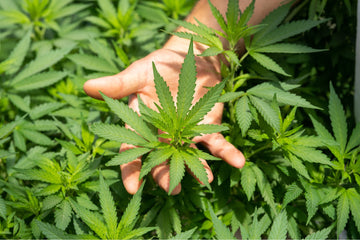CBD for Pets
For thousands of years, humans used cannabis as medicine. Recently, hemp, the fiber-like version, has regained popularity. CBD, the non-intoxicating cannabinoid derived from hemp flowers and leaves, is testified to have helped people worldwide with pain, anxiety, nausea, and seizures. Since these conditions commonly inflict animals too, many people wonder if they can give CBD to their pets. Some pet owners are still hesitant, and rightfully so. Research on CBD is still emerging, and animals respond differently to food and medicine than people. Pet owners should make sure they have done their research before trying CBD on their furry companion. To begin, you'll first need to understand what the Endocannabinoid System is and how it functions.
How CBD Works
Technically, any animal with an Endocannabinoid System can take CBD. The Endocannabinoid System, or ECS, is a major system in all mammals, reptiles, fish, and invertebrates. Essentially, it is in charge of sensing imbalances in the body and reestablishing homeostasis. Its two primary receptors, CB1 and CB2, are located all over the body and read information from other major systems. Sometimes, even the ECS can fall out of balance. When CBD, or other cannabinoids, are ingested, they prompt it back into action. At least, this is how it functions in humans. Researchers only have an understanding of its effects on cats, dogs, and horses. The pharmacokinetics – or how a substance is absorbed and eliminated – is not determined yet.
Science and Symptoms
Fortunately, the effects of CBD on pets are strikingly similar to those on humans. For instance, there have been exciting results with CBD for dogs with osteoarthritis and epilepsy. In 2018, a study examined the safety and efficiency for pain in arthritic dogs. Researchers found that 2 milligrams per kilogram of CBD oil twice daily significantly increased the dogs' comfort and activity. Furthermore, their owners reported no adverse side effects. A preliminary study showed hopeful results of CBD for dogs with epilepsy. Out of sixteen dogs, 89% saw a reduction in seizure frequency after receiving CBD with only 0.3% of THC, the intoxicating cannabinoid that gets people high, or less. A more extensive clinical study is underway to answer critical questions about dosing and pharmacokinetics. Dogs often suffer from anxiety due to thunderstorms, separation anxiety, or even a change in their home life. Fortunately, testimonials also report positive results for both anxiety and nausea. A woman from Arkansas, USA, told Equine Wellness Magazine she saw improvements after using CBD for her nervous mare. Horses often display anxious behaviors harmful to their health like ''cribbing,'' where they repeatedly bite a fence or gate. People have used cannabis to treat nausea for decades. Considering the similarities in how CBD affects both animals and us, it is not surprising that studies have shown effectiveness against nausea in lab rats.
How Safe is CBD for Pets?
What makes CBD so attractive is its low risk for tolerance or side effects. However, it has shown to elevate certain liver enzymes in cats and dogs known to cause liver problems. The study with arthritic dogs found an increase in an enzyme involved in liver function and bone development. In 2019, another study observed the effects of CBD on eight beagle dogs and eight cats for twelve weeks. No discomfort or behavior change occurred, except for in one cat. During administration, the cat displayed excessive licking and head shaking, followed by a persistent rise in another enzyme associated with liver problems. The rise in liver enzymes also suggests that cats and dogs have different pharmacokinetics and that dosing may differ between the species.
Can Pets Have THC?
THC is the intoxicating cannabinoid pertaining to marijuana that makes people feel "high." Unlike in humans, it does not produce a high in animals. Instead, concentrated amounts of THC is toxic to cats and small dogs. THC poisoning symptoms include a lack of coordination, vomiting, apathy, a lowered heart rate and body temperature, and anxiety. In extreme cases, it can send your pet into a coma or death. Unfortunately, there is no antidote except for sleeping it off. If you suspect your pet has THC poisoning, take them to the vet so they can monitor them until it wears off. Luckily, it takes significant amounts of THC to cause illness. To protect your pet, keep them away from marijuana smoke and especially edibles.
Dosing
Dosing is challenging for people and pets alike. For a dog or cat of five kilograms, 1 milligram is considered a small dose, with three being medium and five being large. Always start low, wait a week or two, and then gradually increase if needed. Like with people, CBD needs time to build up in their system. Cost is another concern with CBD, especially for larger animals. But interestingly, bigger animals have slower metabolisms than smaller animals. Consequently, they burn less energy throughout the day and won't need as much CBD as you might think. For example, 20-30 milligrams is considered efficient for behavior and anxiety issues in horses, with 50-60 milligrams for pain and lameness.
Choosing a CBD Product for Your Pet
Always give your pet CBD from hemp to ensure a low concentration of THC. Animals can have full-spectrum, or whole plant extract, as the terpenes and other plant materials are not harmful. Pets can have hemp oil or hemp pollen, though they will most likely find it unpleasant, and administering it to them can be tricky. The easiest route is probably mixing it with their food or giving them an infused treat. You can also try mixing the CBD in bacon grease for dogs, or fish oil for cats. The taste and smell will make it more appealing to them. Any pet owner can testify that they love their pet and don't wish to see them in any discomfort. CBD can be a natural, low-risk option to relieve their distress. Just make sure to get a quality hemp product that has been lab-tested from a trusted producer. As always, and don't hesitate to reach out to your vet for consultation.















